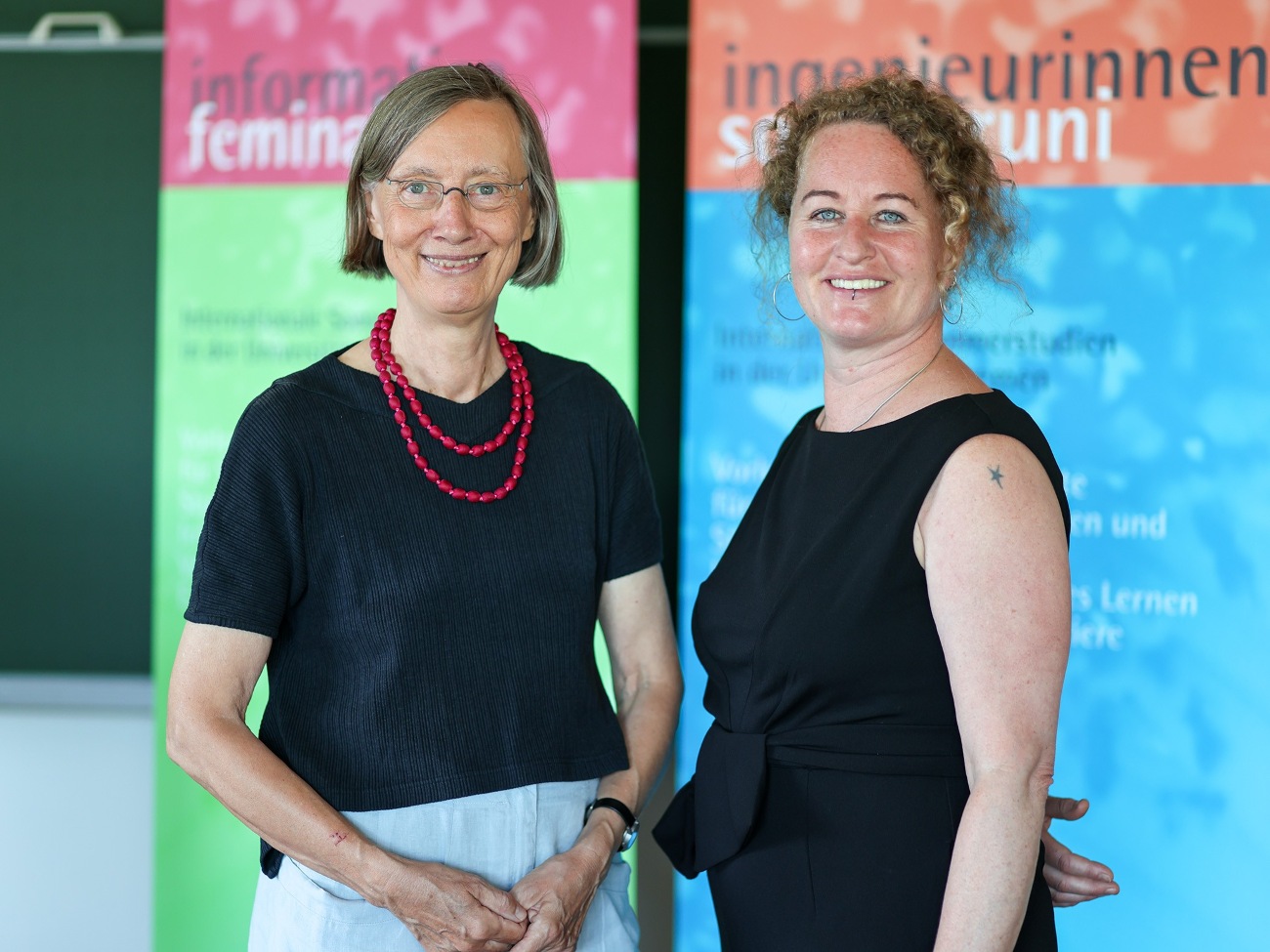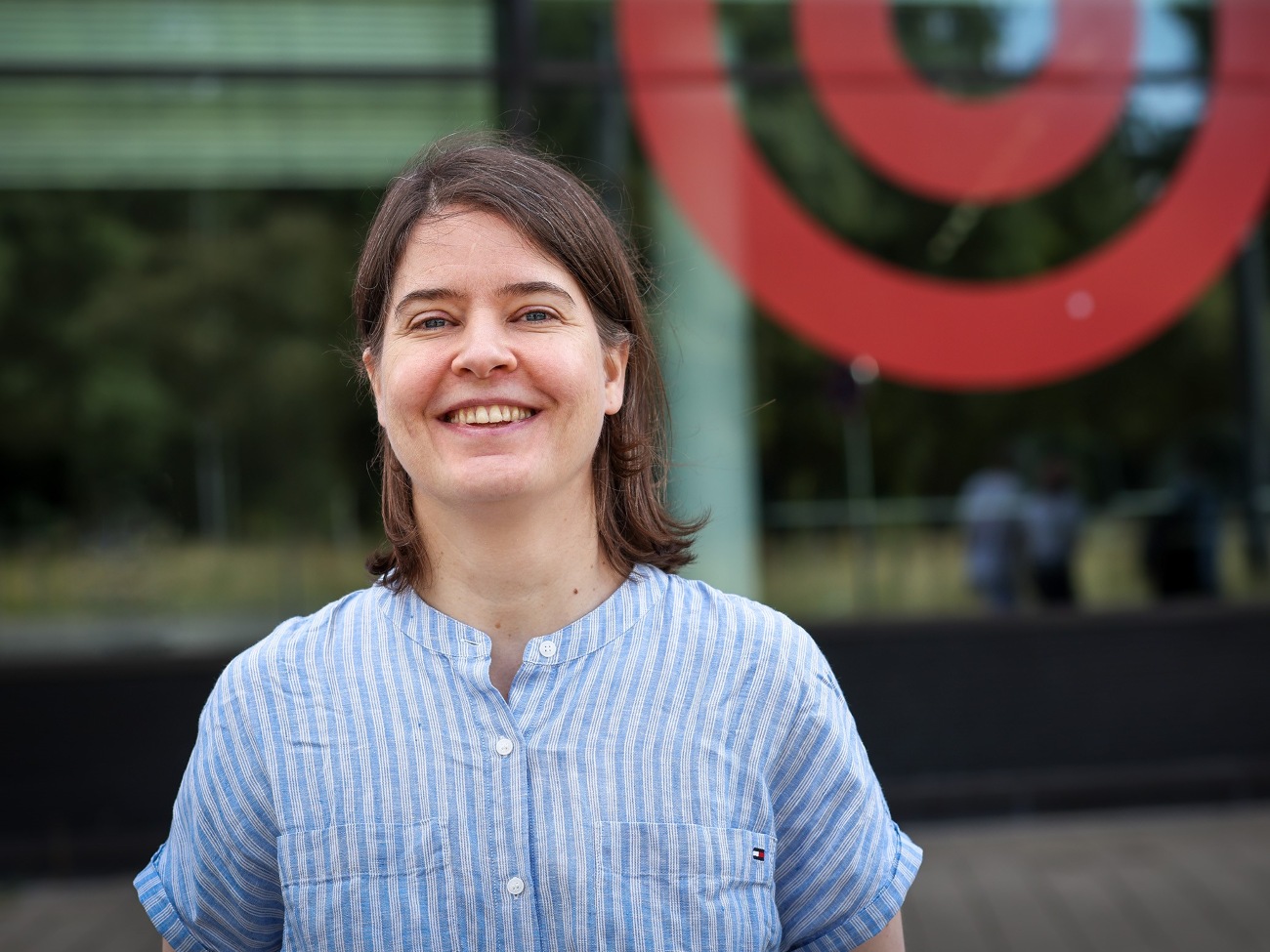
© Birgit Wingrat / Universität Bremen
Promoting Gender Equality Through Summer Universities
The University of Bremen’s Informatica Feminale and the International Summer University for Women in Engineering offer interested women a one-of-a-kind program
This week, 200 female computer scientists and engineers gathered at the University of Bremen’s MZH building. Informatica Feminale, which is taking place for the 28th time, together with its sister event, the International Summer University for Women in Engineering, once again provides a special learning atmosphere that brings together women from all over the world. Participants include students, employees at industrial companies, and researchers. They are all taking advantage of three weeks of learning, sharing experiences, and networking, with a common goal: achieve more gender equality in technical fields.
Anxious excitement fills the air as chairs are moved around in a seminar room on the first floor of the MZH building. Two young women greet each other with a welcoming embrace. Several stragglers make their way through the masses, coffee in hand, determined not to miss the summer universities’ opening ceremony. Veronika Oechtering, computer scientist in Bremen and co-founder of this special event, grabs the microphone. After extending a formal welcome, she directs her words of appreciation to the student assistants managing the conference office. This is unusual, but somehow characteristic for this event. Here, everyone is seen and valued.

© Birgit Wingrat / Universität Bremen
Above all, the opening event is full of praise for the summer universities, which are unparalleled throughout Germany in both their size and approach. Dr. Anne Baumann, who welcomes the participants on behalf of the Bremen State Councilor for the Environment, Climate, and Science, refers to the Summer University as an “export hit” for Bremen. Southern Germany and Austria have created two additional summer universities based on the Bremen model. Dr. Mandy Boehnke, Vice President for International Affairs, Academic Qualification, and Diversity at the University of Bremen, emphasizes the importance of empowering women in science and in technical fields during her welcome speech.
Intensive Teaching in Small Groups
This is exactly what takes place in the roughly 60 courses, which are usually fully booked well in advance. Most participants travel to Bremen to attend the summer universities. Women from several European countries, as well as from Costa Rica, Tunisia, the United States, and Africa take part. What is the secret to this great success? For students, being able to earn credit points for participating certainly plays a role. But that is definitely not everything. “The topics we present are really appealing,” explains Henrike Illig. She is research assistant at the University of Bremen’s Competence Center for Women in Science and Technology and organizes the summer universities together with Veronika Oechtering. The spectrum of topics is very broad, and includes courses on databases, operating systems, programming, as well as software engineering. Topics that bridge computer science and engineering, such as renewable energies and sustainability, are also offered.
An additional characteristic of the summer universities is the intensive learning environment, which is especially notable thanks to the small group sizes of up to twelve people. “Our single-sex educational setting is comprised of only women. The participants are concentrated fully on the exchange of expertise,” Illig has repeatedly noticed.
Ethical Hacking as a Job Profile
Marie Caroline Oetzel can only confirm this. She is a professor for IT security at the Aschaffenburg University of Applied Sciences and is teaching a course at the summer university for the third time. “This is a very interesting environment. I really enjoy being part of it, even though it requires me to carve out time that I don’t really have,” she says. This year, she is offering a course titled “Penetration Testing and Ethical Hacking for Beginners.” The twelve participants wield their undeveloped hacking skills to infiltrate a protected system – obviously within a simulated environment. In reality, such ethical hackers are often employed by companies to uncover and address security vulnerabilities.
“IT security is an area of computer science that is very male-dominated,” the professor explains. Women are often taken aback by the technical hurdles and shy away from the field. “I want to show that women can excel in IT security. In my course, they experience firsthand how easily IT systems can be outsmarted and which areas are more difficult. This not only increases their expertise, it also boosts their self-confidence,” Professor Oetzel is convinced.

© Birgit Wingrat / Universität Bremen
In her experience, participants tend to open up more and more as the course progresses. The collective challenge of hacking often quickly builds bridges. This then leads to conversations about other topics, such as tips for career planning in IT, how to handle overly confident male colleagues, or deal with prejudices against women in technical fields.
Tanja Hanauer from Munich is offering a course at the summer university for the ninth time. She works in the private sector. As a computer scientist with a doctoral degree, she now works to improve information security in the automotive industry. Why does she remain faithful to the summer university? “This is a totally crazy place here, in the best way possible,” she says. “You can meet up with women who staked their claim in technical fields some 30 years ago. Those are very interesting conversations.” Another benefit is that the participants are very motivated. “The sense of determination here is palpable; everyone attending is genuinely committed,” she adds.
Unifying Convenience and IT-Security
A willingness to confront difficult topics is something she experienced in her course again today. The topic was constructing a security structure for a large company. Participants quickly identified the biggest weakness of any IT security system: users who, in their eagerness to quickly get something done, circumnavigate safety measures without hesitation and prioritize convenience over security. “We discussed how to deal with this, that is, how to unite user convenience and IT security. It isn’t something that you can solve right away, it needs to be prioritized,” Haunauer explains.

© Birgit Wingrat / Universität Bremen
What do participants have to say? Mira traveled from Switzerland to Bremen. She has worked in production engineering for more than 20 years, a field in which data analysis plays a key role. “I took a sabbatical to find out what I want to do for the second half of my professional life,” she says. Her father taught her how to program when she was still a child. Despite having spent so many years as an engineer, she never fully relinquished her love for computer science. “For me, the summer university is absolutely perfect, since I can see whether computer science is really the right fit for me.”
Computer Science Degree More Likely Now
This zeal led Mira to enroll in no less than four courses. She has almost finished her project work for the Big Data and Databases course. In the remaining days of the summer university, she will then devote herself to Natural Language Processing and learn how to build a chatbot. Her preliminary conclusion: “I have been able to follow along well so far and am really enjoying it. The atmosphere here is super. There is no competition, but rather a feeling that we are all inspiring each other.” Contacts are casually formed; of course, the evening events and excursions help with this. The Summer University has made her prospects of pursuing a computer science degree a bit more likely – maybe even at the University of Bremen? “That is all yet to be determined, but I certainly have had a very favorable impression of the university and the dedicated people here. Yes, I could imagine that.”
A Few Days with Kindred Spirits
Sophie Teichmann from TU Dresden is also participating in this year’s summer university – for the second time. In the past few days, she has learned how computers communicate with each other in networks and what protocols are used for this. At one point, with a practical lesson. “We completely took apart a computer and even crimped the network cable. That was very nice and hands-on,” the young woman explains. “The atmosphere is so wonderful and open, once again. I am very glad that there is room here for seemingly stupid questions and it is very nice to spend a few days with kindred spirits,” she summarizes.
Sophie Teichmann is a research assistant at the Center for Scalable Data Analytics and Artificial Intelligence in Dresden/Leipzig, one of the top five AI centers in Germany. This career path is one she would likely have never considered without having participated in her first summer university in 2018. “The weeks I spent in Bremen definitely opened the door to computer science for me,” she remembers. Computer science lessons in school were insufficient in piquing her interest, so after graduation, she began a degree in physics. But somehow, she always knew, and the summer university made it clear to her, that physics and computer science go hand in hand.
Informatica Feminale and the International Summer University for Women in Engineering
In 1992, a group of computer scientists from the University of Bremen had the idea to create this format to promote gender equality in their degree program and field. They received support from the nationwide Informatikerinnen-Netzwerk, particularly from the special interest group Women in Informatics of the German Informatics Society. On May 1, 1997, the first summer university began. It has been a permanent component of the University of Bremen’s Faculty of Mathematics and Computer Science course offerings since 2000 and is financed by the Female Professors Program of the federal and state governments and the University of Bremen. The German Informatics Society has issued a recommendation for this program since its inception. The Fakultätentag Informatik (German Council of University Faculties in Computer Science) awarded the Informatica Feminale its first prize for outstanding gender equality work in 2023. In 2005, the International Summer University for Women in Engineering was established. Since 2009, it is held regularly together with the Informatica Feminale.
Further Information:
Website of Informatica Feminale
Website of International Summer University for Women in Engineering